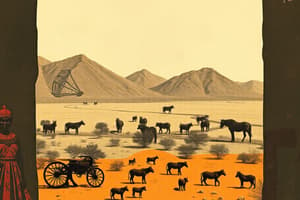Podcast
Questions and Answers
What event in 1713 significantly impacted the Khoikhoi population?
What event in 1713 significantly impacted the Khoikhoi population?
- Introduction of cattle farming
- Founding of Genadendal
- Spread of smallpox (correct)
- Establishment of the Moravian Church
Who was Georg Schmidt and what was his role in Genadendal?
Who was Georg Schmidt and what was his role in Genadendal?
- A trekboer who took over Khoikhoi lands
- A German missionary who taught Christianity (correct)
- A Khoikhoi elder who resisted colonial rule
- A Dutch Reformed Church leader who opposed the Moravians
Why was Schmidt forced to leave Genadendal in 1743?
Why was Schmidt forced to leave Genadendal in 1743?
- Because of pressure from the Dutch Reformed Church (correct)
- He returned to Germany for personal reasons
- Due to conflict with Khoikhoi tribes
- The VOC supported his work against the Khoikhoi
What does the name 'Genadendal' mean?
What does the name 'Genadendal' mean?
What did Vehettge Tikkuie recall about the conditions of her people?
What did Vehettge Tikkuie recall about the conditions of her people?
What does the name 'Genadendal' mean?
What does the name 'Genadendal' mean?
Why did the voc expel Schmidt from Genadendal?
Why did the voc expel Schmidt from Genadendal?
How were the San viewed by European colonists?
How were the San viewed by European colonists?
What was a significant impact of the trekboers encroaching on San lands?
What was a significant impact of the trekboers encroaching on San lands?
What happened to the remaining San by the end of the 18th century?
What happened to the remaining San by the end of the 18th century?
What language did the three San men primarily speak?
What language did the three San men primarily speak?
How many notebooks did Bleek and Lloyd fill with information from the San men?
How many notebooks did Bleek and Lloyd fill with information from the San men?
What was one major contribution of Bleek and Lloyd's work?
What was one major contribution of Bleek and Lloyd's work?
Why is the punctuation in the San names significant?
Why is the punctuation in the San names significant?
What motivated Dr. Bleek and Ms. Lloyd to learn the /Xam language?
What motivated Dr. Bleek and Ms. Lloyd to learn the /Xam language?
What effect would the lack of Bleek and Lloyd's documentation have had on /Xam culture?
What effect would the lack of Bleek and Lloyd's documentation have had on /Xam culture?
Which of the following San men did NOT live at the Bleek family home?
Which of the following San men did NOT live at the Bleek family home?
What was Bleek's professional background?
What was Bleek's professional background?
Study Notes
The Khoikhoi
- Trekboers expanded north and east, seizing Khoikhoi grazing territories.
- In 1713, smallpox decimated the Khoikhoi population; they lacked immunity whereas Europeans did not.
- In 1737, Georg Schmidt established Genadendal, the first mission station in southern Africa, to teach Khoikhoi Christianity.
- Genadendal translates to "valley of grace and mercy." Under Schmidt's guidance, Khoikhoi learned to farm and read.
- The VOC expelled Schmidt in 1743 due to pressure from the Dutch Reformed Church.
- The Moravians returned in 1792 and found a Khoikhoi named Magdalena who shared Bible readings.
- Magdalena's Bible is preserved in Genadendal, housed in a box made from a pear tree planted by Schmidt.
- Early converts, like Vehettge Tikkuie, remembered a time when the Khoikhoi had abundant livestock and resources.
The San
- The San, as hunter-gatherers, relied on natural resources and did not own cattle; they lived mainly in mountainous regions.
- European colonists did not recognize the San’s humanity, interpreting their distinct languages as animal sounds.
- Trekboers encroached on San hunting grounds, leading to conflicts as the San hunted trekboers' livestock.
- 18th-century skirmishes resulted in San men being captured or attacked; remaining San were pushed into unproductive areas or became farm laborers.
- Despite the Dutch settlers' lack of awareness of San presence, the San actively observed and noted the settlers.
William Bleek and Lucy Lloyd
- In 1869, Bleek and Lloyd began documenting the /Xam language using symbols for its click sounds after interviewing San prisoners from the Northern Cape.
- Their work included over 130 notebooks filled with oral histories, beliefs, and stories shared by three San men.
- The documentation preserved vital knowledge about San culture, including the meanings of rock paintings, which might otherwise have been lost.
Key Terms
- Missionary: An individual sent to promote religious teachings.
- Moravian Church: A Protestant denomination known for its missionary engagement.
- Dutch Reformed Church: The primary Christian denomination in the Netherlands until the mid-20th century.
Legacy
- The efforts of Bleek and Lloyd are crucial for understanding San history and culture, providing insights that inform modern interpretations and preservation efforts.
Studying That Suits You
Use AI to generate personalized quizzes and flashcards to suit your learning preferences.
Description
Explore the effects of land dispossession on the Khoikhoi and the influence of European diseases, particularly smallpox, on their population. Learn about the establishment of Genadendal, the first mission station in southern Africa, and its historical significance. This quiz covers critical events and figures that shaped indigenous experiences in the region.


